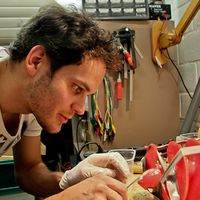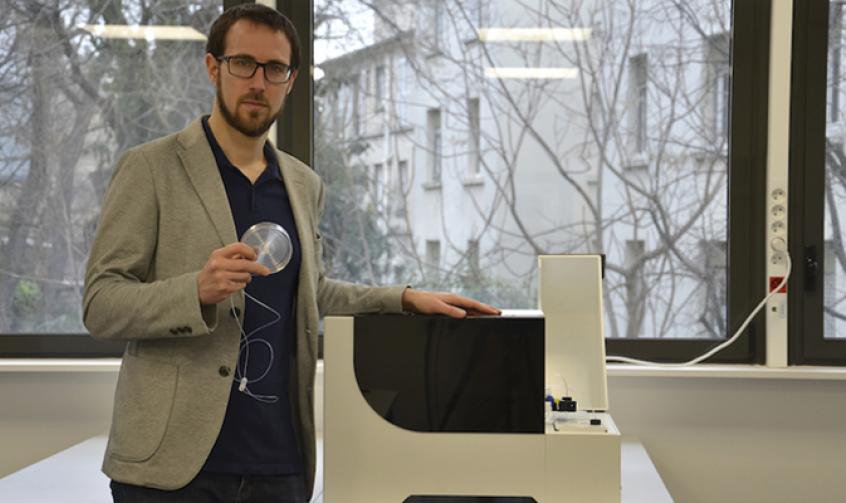"Water and oil have never got on well. The chemical conflict that keeps them separated however is something that microbiologists could take advantage of in order to save time and effort. This is the idea of the young prize winner of Innovators Under 35 France, Laurent Boitard, CEO of the startup MilliDrop and doctor at the University of Denis Diderot in Paris.
Boitard has devised a way of locking up microorganisms inside drops of water in a simple and systematic way, with a thin tube lubricated with oil. His approach consists of putting each one of these drops with bacteria of microalgae or fungi, inside a Teflon duct, and separating them from each other with a drop of oil. This way of encapsulating microorganisms in parallel at a microscopic scale, allows them to grow and we can study their evolution much quicker and more automatically than by cultivating them in test tubes or petri dishes. Boitard´s system allows hundreds of bacterial populations to grow at the same time, extracting fragments of the samples whenever desired, and exposing them to bacteria inside the drops of the substances. The goal is not to replace the analysis instruments but to offer an innovative product that complements existing solutions, explained the youngster.
His prototype, the Millidrop Analyzer, is the size of a desktop printer. It provides a mechanical base that is moved over a group of dishes and with a pipette can suck out drops of the sample (urine, water etc.) that are loaded with microorganisms. The drops that contain the bacteria are stored one by one in the pipette, at the end of the tube. The apparatus sucks out water and urine and then air or gas - which improves the isolation between the drops - and lastly the oil, which is Teflon liquid. In this way, it creates a series of replicated layers inside the duct.
Once trapped, the drops move inside the tube in front of a detector that analyses the growth of the bacteria in each one. The apparatus also provides an injector to insert other substances in the drops like antibiotics for example. The samples can also be collected at any moment.
The MilliDrop Analyser is already used in 5 projects. One of them consists of identifying the morphology of the bacteria that causes urine infections in the samples of patients. Knowing how the bacteria grow and behave that could be genetically identical – for example, if they form biofilms when they grow – gives the doctors clues about the type of infection that the patient will suffer. This can help them decide whether or not it is appropriate to treat them with antibiotics.
Bacteria populations can also be cultivated by selecting their characteristics and studying their evolution over time. For example, by observing what adaptation and performance strategies develop resistance to certain drugs.
In the food and chemical industry, the Millidrop Analyzer would generate important savings. Boitard explains that it would help detect bacteria more efficiently in the production of enzymes, or monitor the performance of those that are currently used. The enzymes present in the microorganisms work like detergents, sweeteners or chicken feed amongst others, in the making of the products.
Millidrop´s clients are above all research labs, but they are also seeking alliances in the clinical world. Their system would be useful in reference centers that monitor the evolution of bacterial resistant waxes, explains Boitard. It would also save the pharmaceutical world resources in the selection of new antibiotic candidates. Finally, the youngster believes that it could impact the study of relations between bacterial populations of the human organism (microbiome) and their health effects. This would accelerate the development of new types of drugs based upon bacteria that are seeking to treat pains like ulcerative colitis.
For Jean-Charles Cailliz, vice president of innovation and development at the Catholic University of Lille, and judge of MIT Technology Review Innovators under 35 France, Boitard´s technology is based on a new and original idea that would allow researchers “to simplify their testing protocols” and improve the performance of their biological tests between “a thousand and a million times”."




